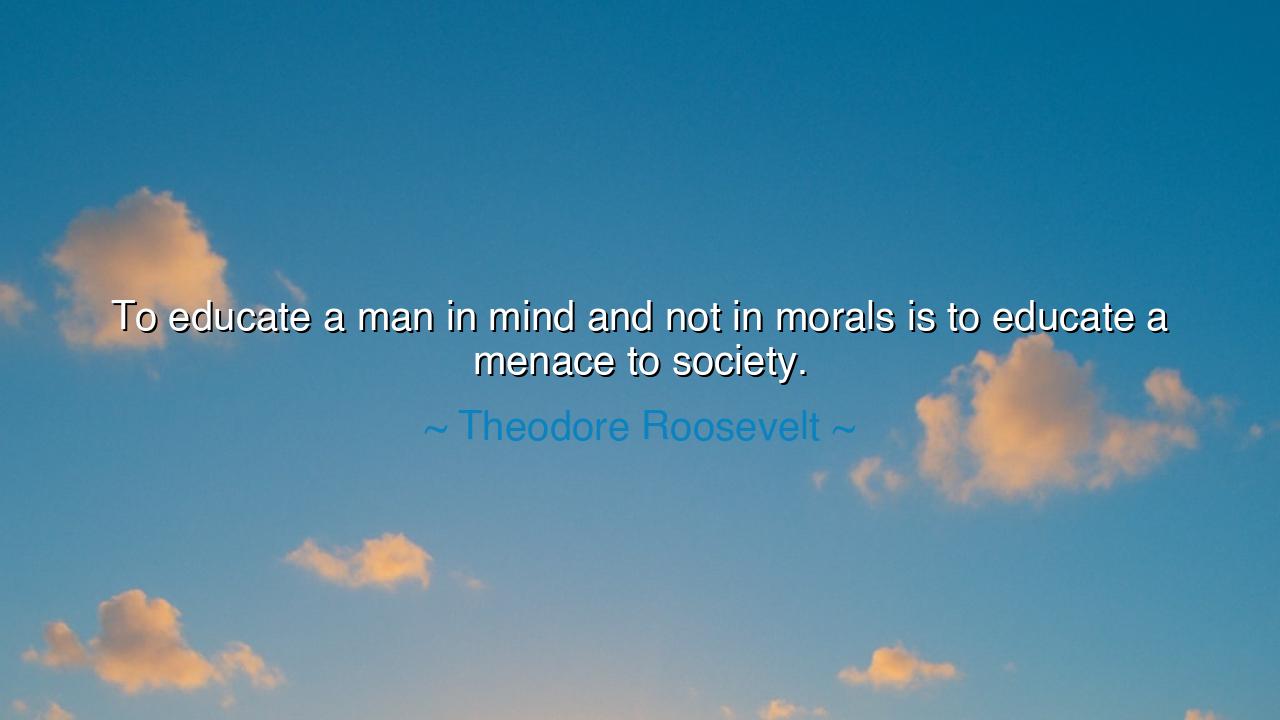
To educate a man in mind and not in morals is to educate a menace






There are words that strike at the very heart of civilization, and among them are the thunderous warnings of Theodore Roosevelt, who declared: “To educate a man in mind and not in morals is to educate a menace to society.” These are not idle words from a distant past, but a timeless summons to the guardians of humanity. Roosevelt, a man of courage and conviction, saw with clarity that knowledge without virtue is like a sword in the hands of the reckless—a weapon that cuts not to defend, but to destroy. He spoke as one who had witnessed the dawn of the modern age, when science and reason grew mighty, but conscience too often lagged behind. His voice was both prophetic and parental, a call for wisdom to walk hand in hand with righteousness.
To educate the mind is to sharpen the intellect, to teach reasoning, invention, and the power of understanding. Yet to educate the morals is to guide the heart—to nurture empathy, integrity, and self-restraint. When one is raised in intellect but starved of virtue, he becomes unbalanced, capable of brilliance but devoid of compassion. Roosevelt saw that such a person becomes not a blessing to society, but a danger—a menace—for intelligence without morality serves only the self, while morality without intelligence serves all. True education, he taught, must unite both, so that wisdom and virtue form a single, indestructible pillar upon which a just society stands.
This truth was not new in Roosevelt’s time; it is ancient as the dawn of civilization. The Greeks knew it when they warned that knowledge without virtue corrupts. The Chinese sages knew it when Confucius said that to cultivate the mind without cultivating the heart leads to ruin. Roosevelt, standing in the lineage of these wise men, translated their eternal insight into the language of a new nation. He spoke as a leader who understood that the might of America—or of any nation—was not in its wealth or armies, but in the character of its citizens. A nation that exalts intelligence without conscience, he knew, will raise clever tyrants, not noble leaders; it will create invention without compassion, progress without peace.
History has offered its grim testimony to this truth. In the twentieth century, entire nations educated their youth in science, discipline, and obedience, yet stripped them of moral conscience. The result was catastrophe: men of intellect serving the machinery of evil, engineers designing camps of death, doctors experimenting on the innocent. They were brilliant, but soulless; educated, but monstrous. They proved Roosevelt’s warning—that without virtue to guide it, education does not uplift mankind; it enslaves it. And so the world learned, through ashes and sorrow, that intellect alone cannot save us. Only when moral wisdom tempers knowledge does learning become light instead of flame.
Yet this truth also finds its nobler reflection in those who unite both mind and heart. Consider Mahatma Gandhi, who was trained in law, steeped in intellect, but guided by moral truth. His education did not make him arrogant, but humble; not a weapon, but a servant of peace. His mind understood the laws of men, but his heart obeyed the laws of conscience. In him, we see what Roosevelt called for—a harmony between knowledge and virtue. And because of this harmony, Gandhi’s intellect became not a menace, but a torch that illuminated the world.
Roosevelt’s words, then, are not only a warning—they are a mandate. Parents, teachers, and leaders must remember that to shape the mind without shaping the soul is to build a tower on sand. Let schools teach wisdom, not just knowledge; let nations value character as much as intelligence. A society that prizes cleverness over goodness will one day be ruled by the clever and betrayed by the good. It is not enough to ask what a man knows—we must ask what he loves, what he honors, what he fears to do when none are watching.
The lesson is eternal: knowledge gives power, but morality gives purpose. Power without purpose is chaos; purpose without wisdom is blindness. Only together do they form the light that guides humanity forward. Let each generation, therefore, seek not merely to be learned, but to be just; not only to be skilled, but to be kind. For as Roosevelt warned, an educated mind without a moral compass may build empires—but it will also destroy them.
And so, let these words be engraved in the hearts of all who teach, lead, and learn: To educate the mind is to strengthen man’s wings; to educate the morals is to guide his flight. One without the other will cause him to fall. But when both unite, man soars—not as a menace, but as a messenger of light to his fellow beings, fulfilling at last the true purpose of knowledge: not to dominate, but to uplift all of mankind.






AAdministratorAdministrator
Welcome, honored guests. Please leave a comment, we will respond soon